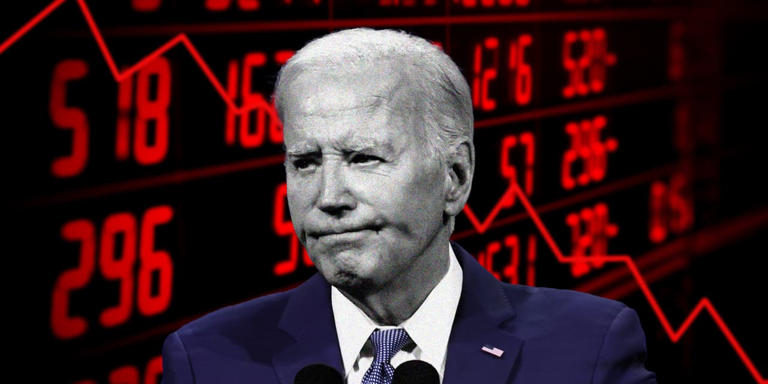The stock market’s downturn on Thursday was notably intense, with Wall Street caught in a wave of selling driven by speculation about President Joe Biden’s potential withdrawal from the presidential race. The Dow Jones Industrial Average fell sharply by 533 points, or 1.3%, while the S&P 500 dropped 0.8%, and the Nasdaq Composite shed 0.7%, according to FactSet data. This decline marked the Dow’s largest single-day percentage drop since May 23, underscoring the market’s volatility and sensitivity to political developments.
Several factors contributed to Thursday’s selloff. One of the primary reasons was the substantial gains in technology stocks earlier in the year, which had pushed the market to new peaks. “First of all, the selloff is long overdue,” said Peter Cardillo, chief market economist at Spartan Capital. He pointed out that the stock market had seen significant gains this year, particularly from a handful of major tech stocks, suggesting that a correction was expected by many analysts.
However, the selling pressure was exacerbated by growing uncertainty regarding President Joe Biden’s future in the presidential race. Speculation has been rampant that Biden might withdraw from the race, which has added to the market’s anxiety. “I think it’s a foregone conclusion that he’ll drop out,” Cardillo stated in an interview with MarketWatch, predicting that Biden might exit the race by the end of the weekend. Despite these speculations, Biden’s campaign staff reiterated on Thursday that the president plans to stay in the race, aiming to quell the rumors and reassure the public.
Earlier in the week, major U.S. equity benchmarks were hitting record highs, buoyed by a failed assassination attempt on former President Donald Trump over the weekend. This incident was perceived to have increased Trump’s chances against Biden in the upcoming November election, providing a temporary boost to the markets. However, the subsequent speculation about Biden’s potential withdrawal overshadowed these gains, contributing to the market’s downturn.
The technology sector, particularly the Nasdaq Composite, was significantly impacted by discussions in Washington about potential increased regulations on technology exports. These regulatory concerns led to a 2.9% weekly drop in the Nasdaq Composite through Thursday. The S&P 500 was on track to shed 1.3% for the week, while the Dow was still expected to gain 1.7% for the week, according to FactSet.
Quincy Krosby, chief global strategist at LPL Financial, emphasized that political uncertainty is adding to the selloff as the market enters a seasonally volatile period. “Political uncertainty is adding to the selloff as the market enters a seasonally volatile and difficult two months,” she said in emailed comments. Krosby noted that the selloff was broad-based, with the Russell 2000 leading the indexes lower and the Cboe Volatility Index, known as Wall Street’s “fear gauge,” climbing higher.
Additionally, there are mounting concerns that the Federal Reserve might need to ease interest rates due to a weakening economy, particularly in the labor market, rather than because inflation is decreasing. These economic worries are contributing to the market’s volatility, adding another layer of complexity to the current environment.
Despite the turmoil, Kevin Gordon, a senior investment strategist at Charles Schwab & Co., advised investors against making investment decisions based solely on political outcomes. He warned against creating a “Biden basket” or “Trump basket” based on who might occupy the White House. Gordon highlighted that the energy sector has outperformed expectations since Biden’s inauguration, advancing roughly 116% in the S&P 500 energy sector despite the administration’s green-energy agenda. In contrast, energy stocks underperformed during Trump’s presidency, despite his promises to increase oil drilling in the U.S.
This period of market turmoil underscores the intricate interplay between political events and economic indicators in influencing stock market performance. The combination of overdue market corrections, political uncertainty, seasonal volatility, and economic concerns has created a challenging environment for investors. The broad-based nature of Thursday’s selloff, led by the Russell 2000 and accompanied by rising fear indices, illustrates the complexity and interconnectedness of these factors, making it a particularly tumultuous time for the stock market.
